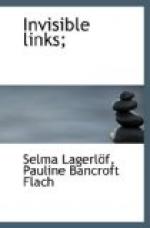“Very well,” answered Liljekrona, “you may go if you will.”
After dinner little Ruster borrowed horse and sleigh, coat and furs. The stable-boy from Loefdala was to take him to some place in Bro and drive quickly back, for it threatened snow.
No one believed that he was expected, or that there was a single place in the neighborhood where he was welcome. But they were so anxious to be rid of him that they put the thought aside and let him depart. “He wished it himself,” they said; and then they thought that now they would be glad.
But when they gathered in the dining room at five o’clock to drink tea and to dance round the Christmas-tree, Liljekrona was silent and out of spirits. He did not seat himself on the bench; he touched neither tea nor punch; he could not remember any polka; the violin was out of order. Those who could play and dance had to do it without him.
Then his wife grew uneasy; the children were discontented, everything in the house went wrong. It was the most lamentable Christmas Eve.
The porridge turned sour; the candles sputtered; the wood smoked; the wind stirred up the snow and blew bitter cold into the rooms. The stable-boy who had driven Ruster did not come home. The cook wept; the maids scolded.
Finally Liljekrona remembered that no sheaves had been put out for the sparrows, and he complained aloud of all the women about him who abandoned old customs and were new-fangled and heartless. They understood well enough that what tormented him was remorse that he had let little Ruster go away from his home on Christmas Eve.
After a while he went to his room, shut the door and began to play as he had not played since he had ceased roaming. It was full of hate and scorn, full of longing and revolt. You thought to bind me, but you must forge new fetters. You thought to make me as small-minded as yourselves, but I turn to larger things, to the open. Commonplace people, slaves of the home, hold me prisoner if it is in your power!
When his wife heard the music, she said: “Tomorrow he is gone, if God does not work a miracle in the night. Our inhospitableness has brought on just what we thought we could avoid.”
In the meantime little Ruster drove about in the snowstorm. He went from one house to the other and asked if there was any work for him to do, but he was not received anywhere. They did not even ask him to get out of the sledge. Some had their houses full of guests, others were going away on Christmas Day. “Drive to the next neighbor,” they all said.
He could come and spoil the pleasure of an ordinary day, but not of Christmas Eve. Christmas Eve came but once a year, and the children had been rejoicing in the thought of it all the autumn. They could not put that man at a table where there were children. Formerly they had been glad to see him, but not since he had become a drunkard. Where should they put the fellow, moreover? The servants’ room was too plain and the guest-room too fine.




